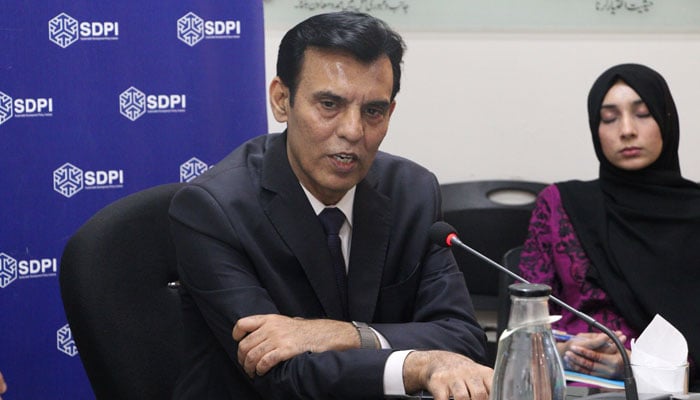‘Let there be female UN SG as women have more understanding of human cost of war’
Islamabad:Dr Abid Qaiyum Suleri, Executive Director, Sustainable Development Policy Institute (SDPI), has said that without women’s leadership, the cycle of conflict continues, whereas the One for Eight Billion is not just a move about a woman in the UN’s top job, rather it is about rewriting the rules of leadership for the 21st Century.
“One for Eight Billion” campaign is a global movement calling for the election of the first female United Nations Secretary-General. Dr Suleri was speaking at a policy briefing with the Women’s Parliamentary Caucus (WPC) organised here by SDPI in collaboration with Southern Voice.
Dr Suleri underscored the historical underrepresentation of women in executive leadership globally. Out of 195 countries, only about 25 to 28 are led by women — a stark reflection of deep-rooted systemic marginalisation,” he exhorted.
Since its inception, the UN never had a woman Secretary-General. Our campaign, “One for Eight Billion” is about changing that, not just symbolically but to usher in an era of inclusive global peacebuilding. Women understand the human cost of war like no one else, he said lauding South Asia’s legacy of powerful women leaders from Benazir Bhutto to Indira Gandhi, Sirimavo Bandaranaike, Khalida Zia and Sheikh Hasina Wajed as proof that the region produced globally respected women in leadership despite socio-political challenges.
He emphasised that the SDPI had longstanding cooperation with Women’s Parliamentary Caucus, calling it “the first resort” for addressing social policy issues. He also highlighted SDPI’s proposed amendments to the Election Commission Act 2019, aimed at increasing women's participation in electoral processes.
MNA Shahida Rehmani, Secretary WPC, called for institutional mechanisms to ensure that women are not only part of political parties but are also empowered to influence party agendas.
MNA Syeda Shehla Raza voiced concerns about enforcement of the five per cent women quota in direct elections. Despite mobilising political movements, women are kept out of decision-making circles. We need robust gender budgeting and localised support systems like NADRA registration centers for women, she continued.
-
 BAFTAs 2026: Kerry Washington Makes Debut In Custom Prada Gown
BAFTAs 2026: Kerry Washington Makes Debut In Custom Prada Gown -
 Jennifer Lopez Gets Emotional As Twins Max And Emme Turn 18
Jennifer Lopez Gets Emotional As Twins Max And Emme Turn 18 -
 Andrew Mountbatten Windsor Blunders Are Result Of 'conspiracy Of Silence'
Andrew Mountbatten Windsor Blunders Are Result Of 'conspiracy Of Silence' -
 Keith Urban Fires Entire Management Team After Divorcing Nicole Kidman
Keith Urban Fires Entire Management Team After Divorcing Nicole Kidman -
 Kylie Jenner Marks Death Anniversary Of Hairstylist Jesus Guerrero With '222' Tribute
Kylie Jenner Marks Death Anniversary Of Hairstylist Jesus Guerrero With '222' Tribute -
 Daniel Radcliffe On How It's Like Seeing New Harry Potter Cast Years Later
Daniel Radcliffe On How It's Like Seeing New Harry Potter Cast Years Later -
 Andrew Portrait Makes Unexpected Debut At Louvre Museum Over Epstein Protest
Andrew Portrait Makes Unexpected Debut At Louvre Museum Over Epstein Protest -
 Italy: Skeleton Of Saint Francis Of Assisi’s Goes On Public Display For First Time After 800 Years
Italy: Skeleton Of Saint Francis Of Assisi’s Goes On Public Display For First Time After 800 Years -
 Hailey Bieber's Subtle Gesture For Eric Dane’s Family Revealed
Hailey Bieber's Subtle Gesture For Eric Dane’s Family Revealed -
 Moment Prince William 'broke Down' And 'apologised' To Kate Middleton
Moment Prince William 'broke Down' And 'apologised' To Kate Middleton -
 Paul Mescal And Gracie Abrams Stun Fans, Making Their Romance Public At 2026 BAFTA
Paul Mescal And Gracie Abrams Stun Fans, Making Their Romance Public At 2026 BAFTA -
 EU Rejects Any Rise In US Tariffs After Court Ruling, Says ‘a Deal Is A Deal’
EU Rejects Any Rise In US Tariffs After Court Ruling, Says ‘a Deal Is A Deal’ -
 King Charles Congratulates Team GB Over Winter Olympics Success
King Charles Congratulates Team GB Over Winter Olympics Success -
 Meryl Streep Comeback In 'Mamma Mia 3' On The Cards? Studio Head Shares Promising Update
Meryl Streep Comeback In 'Mamma Mia 3' On The Cards? Studio Head Shares Promising Update -
 Woman Allegedly Used ChatGPT To Plan Murders Of Two Men, Police Say
Woman Allegedly Used ChatGPT To Plan Murders Of Two Men, Police Say -
 James Van Der Beek's Widow Mourns Eric Dane Days After Husband's Death
James Van Der Beek's Widow Mourns Eric Dane Days After Husband's Death




